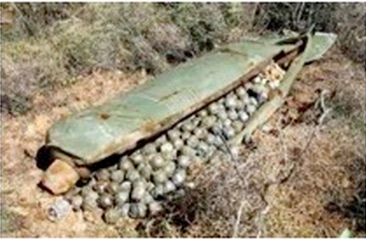DISARMAMENT AND SECURITY ..
An article from Artistes pour la Paix
The 1st Review Conference of the Convention on Cluster Munitions is wrapping up in Dubrovnik, Croatia. For the most part, this meeting has been full of good news. Colombia ratified the Convention, Cuba issued a surprise announcement that it is working towards joining the treaty as well and a number of states announced that they have finished destroying their stockpiled cluster munitions. These successes show that the treaty is working and the norm against cluster munitions is growing.

Amidst all this success, Canada joined the United Kingdom and Australia in an attempt to weaken the norm against cluster munitions by objecting to the Dubrovnik Declaration‘s condemnation of all use of cluster munitions. For these three states, the idea that they would have to condemn all use of cluster munitions was not acceptable despite being states parties to a treaty banning cluster munitions. Mines Action Canada staff and campaigners from around the world in partnership with friendly governments lobbied hard for the declaration to stay strong. In the high level discussion state after state took the floor in support of a strong declaration condemning all use of cluster munitions.
Again and again states passionately defended the Declaration as it was and to reaffirm that any use of cluster munitions by any actor was unacceptable. In the end, the Declaration was adopted without amendment. We were thrilled to see our hard work pay off. The norm against use remains strong and so does the Convention on Cluster Munitions.
We were able to prevent Canada, the UK and Australia from weakening the declaration this time but we need your support to ensure that we will be ready next time someone threatens the norm against these inhumane weapons.
Mines Action Canada [info@minesactioncanada.org] would appreciate your support
Their site contains the following crucial information:
151 financial institutions worldwide invested US$27 billion [27 milliards de $!] in companies producing cluster munitions from 2011 to 2014, according to a report launched by Dutch peace organization PAX. The report, “Worldwide Investments in Cluster Munitions: a shared responsibility,” details the scale of investment in companies producing this banned weapon by banks, pension funds and other financial institutions around the world. Two Canadian financial institutions were singled out for their investment in cluster munition production in the report’s Hall of Shame.
While Canada and the majority of states have banned cluster munitions due to the humanitarian risk to civilian populations, production of the weapon continues in a limited number of countries yet to join the 2008 Convention on Cluster Munitions.
(Article continued in right column)
Can cluster bombs be abolished?
(Article continued from left column)
“Cluster munitions are currently killing civilians in Syria and eastern Ukraine and they continue to claim lives in Laos fifty years after they were used. Yet financial institutions have invested US$27 billion—more than twice the GDP of Laos—in producers of this inhumane weapon. Canada has banned cluster munitions and during the lengthy discussions about the legislation government officials and parliamentarians frequently stated that investment in cluster munition producers is in fact considered aiding in their production and is illegal,” said Paul Hannon, Executive Director.
The new report from PAX shows which financial institutions have invested in cluster munition producers between June 2011 and September 2014. The report’s “Hall of Shame” shows the majority of investments come from financial institutions in states that have not yet joined the Convention on Cluster Munitions. Yet financial institutions from countries like Canada that have joined the treaty are also still involved.
Royal Bank of Canada and Sun Life Financial appear on the “Hall of Shame” list for their investments in cluster munition producers. These investments are falling foul of the treaty’s prohibition on assistance in the production of the weapon and of the recently passed legislation implementing the Convention in Canada which criminalizes aiding and abetting cluster munition production.
“Cluster munitions are banned by international law; a majority of the countries in the world has recognised that this weapon is unacceptable. And yet cluster munition producers are still able to fund their activities. Financial institutions should introduce robust policies to ensure they are not supporting companies involved in the production of this banned weapon,” said Suzanne Oosterwijk, co-author of the PAX report.
While the number of financial institutions investing in companies producing cluster munitions remains high, the report shows an increase in financial institutions with policies to prohibit this practice. Seventy-six financial institutions are listed in the 2014 report as having cluster munition policies in place.
Recent use of cluster munitions in Syria and eastern Ukraine further demonstrates the urgent need to eradicate this weapon. Last month Cluster Munition Coalition member Human Rights Watch documented widespread use of cluster munitions in eastern Ukraine, in fighting between government forces and pro-Russian rebels. In Syria, civilians account for 97% of recorded deaths where cluster munitions have been used over the past two and a half years.
This report follows a similar report released by PAX on investment in nuclear weapons. The Don’t Bank on the Bomb report found that numerous Canadian financial institutions are investing in nuclear weapons production [La Financière Sun Life en tête]. Mines Action Canada calls on all Canadian financial institutions to adopt strong policies prohibiting investment in banned and indiscriminate weapons.
(Thank you to Janet Hudgins, the CPNN reporter for this article)